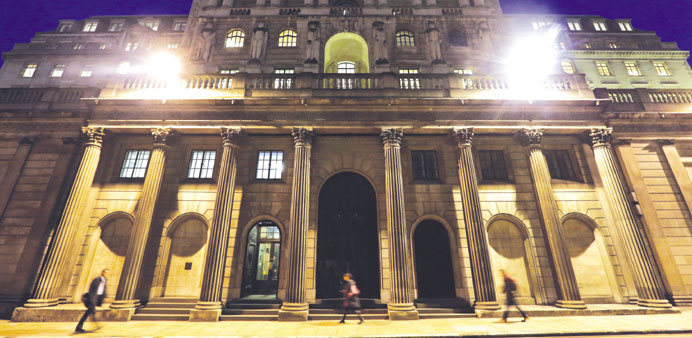The BoE left monetary policy unchanged after its January 8-9 rate-setting meeting, sticking to its plan to hold borrowing costs at a record low.
Reuters/London
The Bank of England kept investors guessing yesterday as to whether it might be considering a change to its pledge to keep interest rates on hold as Britain’s economic recovery picks up.
The BoE left monetary policy unchanged after its January 8-9 rate-setting meeting, sticking to its plan to hold borrowing costs at a record low until the country’s surprisingly fast economic turnaround broadens out.
It also did not take the unusual step — but one which some investors had considered possible — of issuing a statement to address the speed at which Britain’s unemployment rate is falling towards its threshold for considering a rate hike. “No guidance on guidance yet,” Investec economist Philip Shaw said in a note to clients. He said details of discussions among the BoE’s policymakers on their options for changing guidance were likely to appear when minutes of this week’s meeting are published on January 22.
Britain moved from being a laggard to a leader in terms of growth among the world’s biggest economies last year.
Its economy is expanding by more than 3% in annualised terms although there are concerns the recovery could prove unsustainable, especially as wage growth remains weak.
The BoE said in August it will not think about raising rates until unemployment falls to 7%. Since then unemployment has come down much faster than the Bank expected, raising questions about how long it can hold off on raising rates. But inflation has also fallen to within a whisker of its 2% target, reducing the pressure on the BoE.
After its two-day meeting, the Bank’s Monetary Policy Committee kept interest rates at 0.5%, as expected by all the economists who took part in a Reuters poll.
It also left its bond-buying programme unchanged at £375bn ($618bn).
The turnaround in Britain’s economy contrasts with the situation in the eurozone, its main trading partner, where the European Central Bank is expected to use a news conference on Thursday to remind investors it could ease policy further.
The pace of Britain’s recovery has helped the pound to strengthen by 5% against the euro and 10% against the dollar since the middle of last year.
Sterling strengthened briefly against the dollar after the MPC’s announcement of no change in policy. British government bond prices rose slightly.
Governor Mark Carney has sought to dampen speculation about an early rate rise, stressing how Britain’s economy remains 2% smaller than before the financial crisis, unlike many other industrialised nations which are now bigger than in 2008.
He and other policymakers have said repeatedly that the 7% threshold is not an automatic trigger for a rate hike.
But with unemployment falling to 7.4% at its most recent reading and expected to drop further in coming months, some economists say the BoE will have to tweak its guidance on when it will start to consider raising interest rates.
In a Reuters poll published last week, 13 of 41 economists said the BoE would need to lower its 7% jobless rate threshold, mirroring a move taken the US Federal Reserve.
Economists say the MPC might choose to change or scrap the guidance plan as soon as next month. It is due to hold its next policy meeting on February 6 and publish a quarterly inflation report and hold a news conference on February 12.
Rob Wood, a former BoE economist, said the time had come to drop guidance.
“They should certainly not lower the unemployment threshold, which would just make a mockery of the guidance policy,” said Wood, who works at Berenberg bank. “What is the point of giving guidance if the BoE can shift the goal-posts whenever it likes?”
Britain’s fast-recovering housing market has added to the speculation that the BoE might have to tighten monetary policy sooner than it originally intended.
But Carney has stressed that the Bank has a range of tools it can use to tackle the risk of a property bubble, such as curbs on mortgage lending, without resorting to the “blunt instrument” of raising interest rates.

